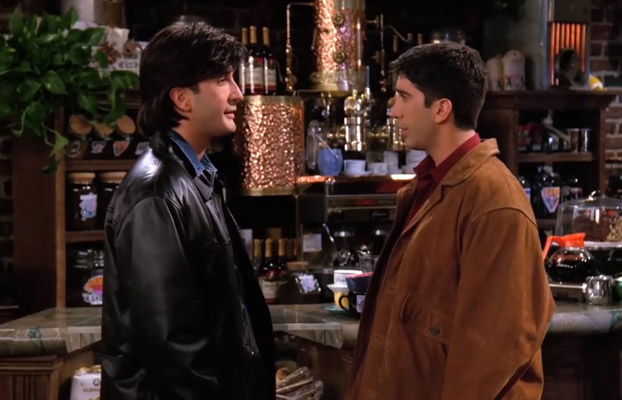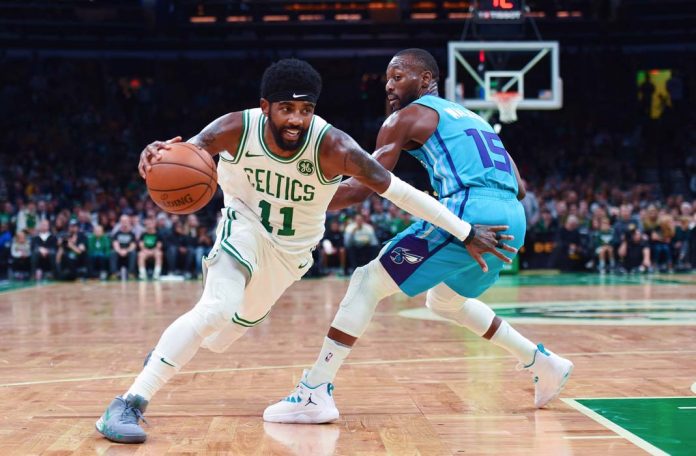Season 2, Episode 10 of Friends: “The One With Russ”. Rachel breaks up with Ross and starts dating a stranger, Russ. Russ looks exactly the same as Ross, acts like Ross, sounds like Ross, and is, basically, Ross in a leather jacket. The only difference is that Russ has Chandler Bing’s haircut (which, by the way, only looks good on Chandler Bing and NO ONE ELSE), and is a teeth nerd instead of a dinosaur bones nerd.
Celtics GM Danny Ainge is Rachel Green. Signing Kemba Walker is the equivalent of Rachel’s rebound relationship with Russ. At least Rachel realized her mistake quickly and ended the relationship shortly after. Ainge won’t have the same flexibility. After all, Rachel wasn’t obligated to pay $38 million a year to a 34-year-old PG.

To start, Kemba Walker and the Boston Celtics aren’t a bad fit basketball-wise. Kyrie Irving wasn’t a bad fit basketball-wise either. The rest of the team just thought he was a weirdo. Kemba isn’t quite the same player as Kyrie, but essentially, he performs the same role. Walker likes to do his work off-the-dribble, excelling in isolation situations that allow him to play his defenders with his ball-on-a-string handles. Sound like a certain free agent Celtics point guard we know? Actually, there are two players who fit that description (hello, Terry Rozier), but you know which we’re talking about.
Irving, with his head straight, fit well in Brad Stevens’ offense. It caters to PGs with scoring abilities and even makes them look better than they actually are sometimes. The reason why it didn’t work this year was the selfish attitudes of many of the players. The minute the Celtics missed a couple of shots, Irving would often go straight into hero-ball mode to save his team, completely hijacking the offense. This, in turn, would lead to Jayson Tatum also entering black-hole mode after not receiving the ball a couple of trips down the floor. That then circled to Jaylen Brown trying to do too much as well, to prove that, he too, was a rising star like Tatum.
So a couple of bad possessions winds up being a couple of bad quarters, and the cycle repeats itself. Of course, there was also Stevens trying to use Gordon Hayward like Paul George when he clearly wasn’t ready and would’ve been much better as a playmaker instead. There was also Marcus Morris refusing to pass the ball, Terry Rozier thinking he was Kyrie, etc. We can stop here. Any more just opens up a rabbit hole, and this discussion about why the Celtics sucked could probably go on for a while.
The idea behind this signing is clear. Kemba’s going to give his best imitation of Kyrie, and hopefully, Boston gets some wins. And, to that extent, it makes sense. Walker seems less like a Flat-Earther and more like someone who’s willing to fit in with the team. Poor old Kemba’s just sick of playing with Frank Kaminsky and is willing to just play some competitive basketball at any cost. He’s never tasted winning in his career, and as a star entering his 30’s, he’ll be ready to sacrifice. To Walker’s credit, he’s clearly a classy guy not prone to bouts of drama.
In Year 1, the Celtics will succeed. They’ll win 50 games, and Celtics fans will be happy again. They’ll anoint Walker as a better PG than Irving (debatable) and find themselves a new fan-favorite. If you thought this was going to be a criticism of Kemba Walker, sorry to disappoint. We’ve never seen what the man could do with some actual above-average NBA players on his team, so it’s unfair to judge. This “horrible idea” has nothing to do with Walker as a player, but rather, the thought of signing a 29-year-old PG to a $141 million deal.
Kemba Walker isn’t young anymore by basketball standards. He’s 29 and is listed at a generous 6’1″. Walker is skilled, yes, but has built his entire basketball foundation on his quickness due to his diminutive size. His handles are among the best, but much of it has to do with the lightning-quick burst and sharp changes of direction aided by his agility. Walker also requires a lot of elevation on his jumper, especially on the step-backs he’s made his signature move. His game isn’t predicated on his athleticism, but you’d be a fool to think he could maintain this production for much longer. Kemba is a scrappy fellow, but in the end, Father Time always wins.
Long story short, there’s going to be an inevitable decline. Boston will be paying an average of $35 million annually to an undersized PG who’ll be declining every year. Just take a look at this projected pay scale, courtesy of SLAM magazine.
Players Signing With A New Team (Four Years, 5% Raises)
| Season | 6 Or Less (25%) | 7 To 9 (30%) | 10 Or More (35%) |
| 2019-20 | $27,285,000 | $32,742,000 | $38,199,000 |
| 2020-21 | $28,649,250 | $34,379,100 | $40,108,950 |
| 2021-22 | $30,081,712 | $36,098,055 | $42,114,397 |
| 2022-23 | $31,585,798 | $37,902,957 | $44,220,117 |
| Total | $117,601,761 | $141,122,113 | $164,642,465 |
Boston’s already dealing with Hayward’s max deal, and nobody knows if Hayward will ever live up to it. So, great, now Boston has two potentially disastrous deals in the 2020s, just in time for Tatum and Brown to become free agents.
Both Hayward and Walker will be making $34 million in 2020, leaving very, very (and I stress, very), little room for Boston to bring back Jaylen Brown on anywhere close to a max deal. By then, you’re hoping Brown will be an All-Star candidate or close to one. Players of that caliber typically demand a max, especially one who’s so young. Luckily, Hayward’s deal will be done in 2021, but Walker’s salary climbs to $36 million that season, at age 32. Now, with Kemba swallowing a third of the Celtics’ cap space, they’ll be scraping the barrel to find leftover change for depth.
At this point, what is Boston going to have as its core? Ainge has a small window before Kemba starts to seriously decline, and that’s most definitely not enough time to build a championship team. After that, Walker’s contract will be so unbelievably bloated that Boston will have a better chance at winning a ring than trading it away (very small).
What’s the point of signing Walker? He isn’t going to be the player that brings Boston a championship, but Boston is treating him like he is. This was supposed to be the Celtics’ chance to restart and see what they have in their young core. It’s under-looked, but the Celtics have some very promising young players. They added three rookies that they feel good about in Romeo Langford, Grant Williams, and Carsen Edwards. One of them is bound to stick, and if they’re, lucky all three do. Shouldn’t Boston at least give them a chance before going all win-now mode? They also still own Memphis’ unprotected first next year, which could end up being another top-five selection. So, yes, Boston technically still has trade assets, but realistically, isn’t it just better to see what they have first?
Don’t forget that neither Tatum or Brown has gotten a chance to lead a team, except for a few games in the 2018 playoffs. Hey, the 2018 playoffs, Danny Ainge! Both Brown and Tatum looked phenomenal and helped push Boston to the Conference Finals. Don’t you want to at least try seeing if that’s something that could be long-term?
To sum it up, Kemba Walker is a nice short-term solution. If you ignore the salary, it’d be all sunshine and rainbows in Boston. Except, the Celtics won’t be able to ignore the salaries once they realize they’ll have very little cash left to sign any semblance of depth. There’s a very low ceiling to this team.
A “Big 3” and no depth only works when the “Big 3” includes two top-five players. Tatum might be able to get there (and a very tentative might), but Brown? That’s way less likely.
Kemba is a great player and could be useful to a contending team (the Lakers or 76ers), or one that desperately needs star power (the Mavericks or Suns). The Boston Celtics don’t fall into either of those categories. At the end of the day, there’s no real purpose to this signing. Don’t make a move for the sake of making a move, Boston. You just have to let some things go.
Instagram: @j_persources

